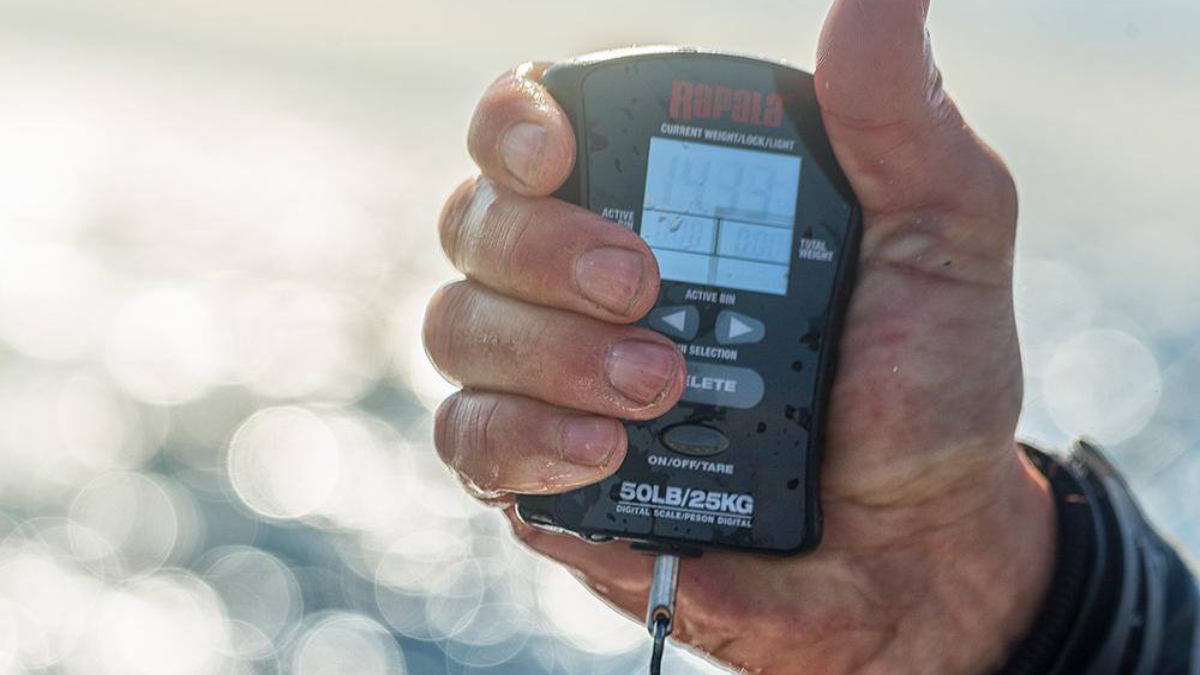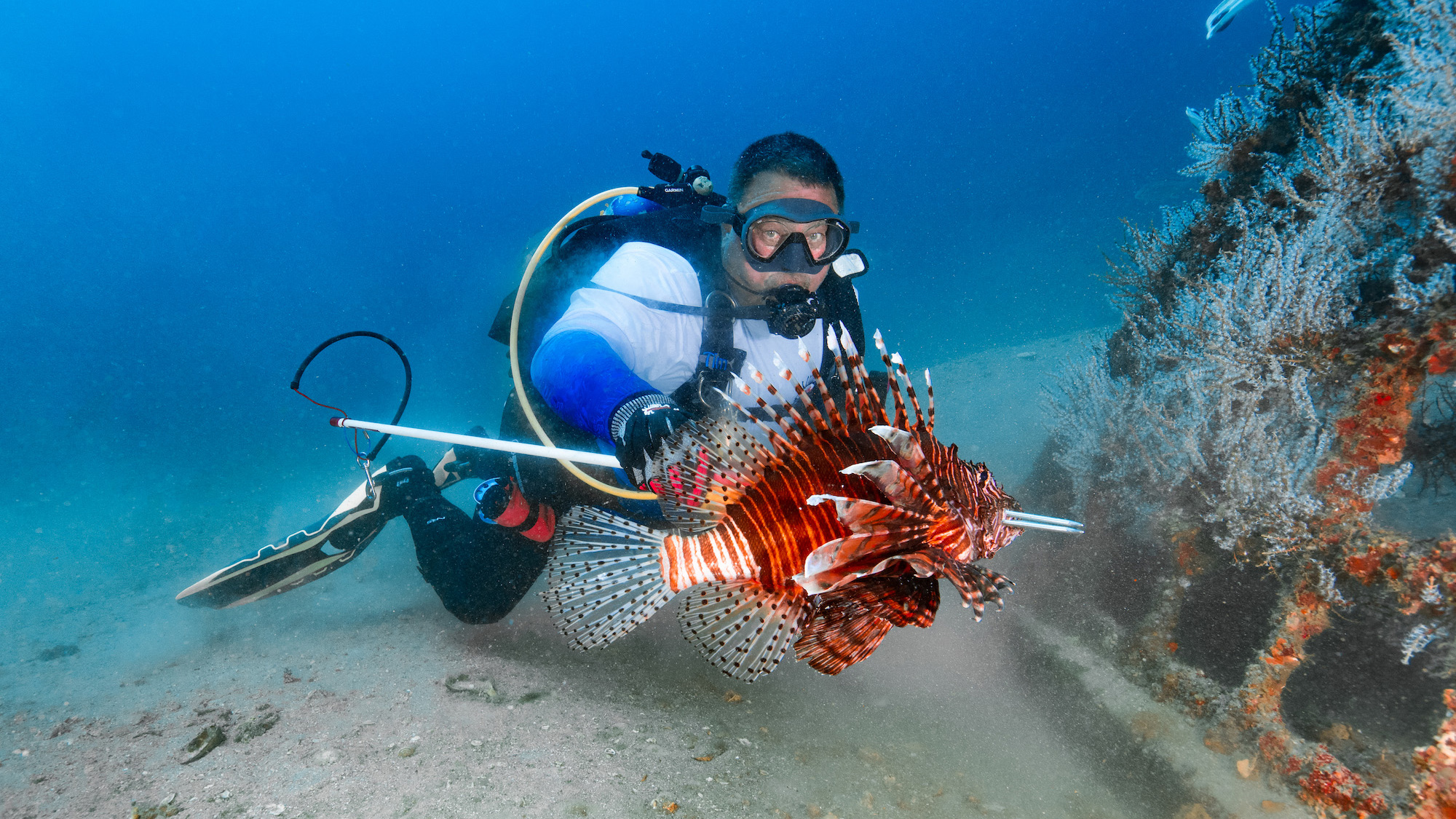We may earn revenue from the products available on this page and participate in affiliate programs. Learn more ›
Fish scales are essential when you catch a new personal best and want to remember it for the rest of your life. Good scales are accurate, easy to use, and have great battery life for when you need them most. There are plenty of different options from spring scales to digital scales, but when it comes down to it, they need to easily and accurately weigh your fish.
As a serious angler and fisheries biologist, I am around scales constantly. During college, I can remember several instances where a good scale meant all the difference, even if it was just for bragging rights against your friends. In the biology field, scales are a crucial part of gathering data for population analysis of any gamefish.
Every scale is designed for a specific purpose, so the perfect scale for bass anglers may not be the perfect one for catfish junkies. Regardless of how you plan to use it, a good scale is a must for any angler. Here are some of my picks for the best fish scales that are reliable and built to last.
The Best Fish Scales
Best Overall
Specs
- Weight Capacity: Up to 60 lbs.
- Mechanism: Digital scale
- Weight Hook Style: Lip gripper
Pros
- Stores up to 99 weights
- Waterproof design
- Bluetooth compatible
Cons
Two years ago, I saw the Bubba Pro scale at ICAST. It instantly piqued my interest as a contender for serious anglers needing a bomb-proof scale. Out of the box, quality is apparent. The entire scale is wrapped in Bubba’s nonslip grip material, making it comfortable and secure for on the water use. It is also waterproof, a nice feature for unruly fish. It can be powered by the rechargeable lithium-ion battery included or two AA batteries in a pinch.
The next step was to dive into the function of the scale. It’s operated by a touchpad of arrows, a clear button, and a lock button. Anglers can easily switch between weight slots and store up to 99 weights, for reference, the next best was 8 weights. It also comes ready with several different modes including tournament and competition mode. While I didn’t need this for casual fishing, it’s a great addition for tournament anglers. The scale is also Bluetooth compatible, enabling anglers to transfer and store data on the phone app. Yet the most important feature of this scale is its accuracy. It delivers precise measurements with a standard deviation of 0.3%. This scale is by no means budget-friendly, but there is a reason it’s the official scale of Major League Fishing.
Best Lip Gripper

Specs
- Weight Capacity: Up to 60 lbs.
- Mechanism: Spring-operated
- Weight Hook Style: Lip gripper
Pros
- Reasonable size to carry all day
- Corrosion-resistant
- The lip grip stays secured
Cons
The original lip gripper scale, the Boga Grip Fishing Scale, is the best lip gripper for a reason. Built entirely of stainless steel, it is a great option for saltwater or freshwater anglers. I find them especially handy when dealing with large toothy fish. Simply pull the thumb bar back and latch it onto the mouth of the fish and it’s locked in. I find myself using one regularly for snakeheads, barracudas, and other toothy fish. The scale mechanism is built on a spring system that works as gravity pulls down on the fish.
The barrel of the Boga Grip is etched with weight markings that slide down depending on the weight of the fish. For larger fish, the 60- and 30-pound options weigh in half-ounce increments while the 15-pound will do quarter-ounce increments. During the accuracy test, the Boga Grip consistently weighed over, reading in the 15 pound range on our 13.5 pound plate. If accuracy is a must this may not be the best option, but for me, this is a tool to manage unruly fish with the added benefit of a scale. It’s easy to use and will get you in the ballpark of how much a fish weighs.
Best Budget

Specs
- Weight Capacity: Up to 50 lbs.
- Mechanism: Digital Scale
- Weight Hook Style: Lip Gripper or Hook
Pros
- Simple and straightforward to use
- Runs on standard size AAA batteries
- Affordable
Cons
Bass Pro Shops line of products includes several scales, such as the budget-friendly XPS Digital Scale. Despite its entry-level price point, the XPS has several features commonly found in high-end scales. The first was its lip gripper attachment. It locked in just as expected and controlled fish while weighing them. The next and most impressive feature is its ability to store multiple weights. Using codes A through H, anglers are able to save weights, override existing weights, and get an idea of how their bag of fish stacks up for the day.
With its price point in mind, testing was critical to see just how it stacked up against premium scales. When weighing the known weight plate (13.5 pounds) the scale consistently weighed slightly heavy. We received multiple weight outputs of 13 pounds 13 ounces. That said, this scale will get you fairly close at a fraction of the cost of others. It also is incredibly user-friendly. The entire unit is controlled with three buttons, perfect for quick measurements. My favorite part of this scale is that it is all powered by two AAA batteries. When you’re heading to the water and realize the scale is dead finding new batteries is easy.
Best Digital

Specs
- Weight Capacity: Up to 50 lbs.
- Mechanism: Digital Scale
- Weight Hook Style: Fish Gripper
Pros
- Lighted LCD screen for easy viewing
- Very accurate
- Can store up to eight weights
Cons
The Rapala Touch Screen Scale is an easy to use digital scale with plenty of added features. Out of the box, the scale has a great feel to it with a tapered and grippy handle that is comfortable to hold. This is especially important for big fish. Two AA batteries will get you 400 hours of runtime, so your scale will be ready for when you need it most. Of all the scales I tested, the touchscreen feature on this one immediately stood out. It’s a little tricky at first, but once you get the hang of it, navigating the menus and options is quick and efficient.
In our testing, this was one of the most precise scales, consistently weighing in at the 13.5-pound mark. For those fishing tournaments, anglers can store up to eight weights, giving you a good idea of your bag weight when it’s time to hit the official weigh-ins. In addition, the lip gripper that comes attached keeps your fish from flopping around and potentially injuring itself. Any bass angler can benefit from this scale, but with a weight capacity of up to 50 pounds, it is a great option for targeting bigger fish like striped bass or catfish.
Best Saltwater

Specs
- Weight Capacity: Up to 110 lbs.
- Mechanism: Digital
- Weight Hook: Gill Plate Hook
Pros
- Simple to use
- Folds down for convenient storage
- Steel reinforced arms for heavy fish
Cons
Saltwater anglers are after big fish and weighing them can be tricky. The Bass Pro Shops CatMaxx Scale is the best saltwater scale and comes in at an affordable price. Originally designed for big catfish, it transfers to saltwater seamlessly. The 110lb. weight capacity is great for a majority of saltwater fish including cobia, wahoo, striped bass, or kingfish. It folds down to a convenient size so it can be stored in a boat hatch or bag for safekeeping. The handles are made out of reinforced steel with a rubberized coating. Even when big fish are flopping around the scale holds up and will not break.
For trophy fish, the eye hook at the top of the scale allows you to run a larger pole or rope through the scale to make lifting easier. If you chase fish at night, the backlit LED screen ensures you can read the weight. While designed for freshwater, it holds up remarkably well to saltwater and is a great addition to any boat.
How We Tested Fish Scales
The test for a good fish scale is accuracy and ease of use. After all, what good is a scale if the weights are not correct? To properly test this, we started with a set weight, a metal plate with a known weight of 13.5 pounds. We then took each scale, tared them out to zero, and attached them to the plate. We recorded the weight readout and compared it to the known weight, giving us an accuracy measurement of each scale. This was done on dry land to get the most precise readings possible and avoid any discrepancies from wave action.
Our next test was scale usability. This category is made up of a number of factors including how easy the scale is to navigate, what special features it has, the overall design, and the design of the weight hook. The first phase consisted of testing functionality with the same weight we tested accuracy. This gave us a better feel for the scales and how they work. In phase two, we hit the water with the scales, fishing for bass, snakeheads, and anything else we could find in South Florida. This provided feedback on how the scales performed on the water. Comprehensively, this allowed us to rank each scale, see where they excelled, and find the best application for the scales in the test.
Even the most expensive scales can be finicky if you don’t know what to look for. I find scales that tare easily, are sturdy to withstand hundreds of fish, and have good battery life are a good starting point. I took the time to find the best scales for just about any fish except a marlin. Here are the criteria I based my selection on:
- Durability: How does the scale hold up against a bunch of fish?
- Battery Life: How long does the battery last?
- Battery Type: Are the batteries easy to come by?
- Fish Safety: Does the scale safely handle fish?
- Weight Capacity: How heavy of a fish can it weigh?
- Accuracy: Is the scale accurate with known weights?
How to Pick a Fish Scale
Choosing the correct scale for your kind of fishing can be tricky if you are not familiar with scales. Several things set apart the best scales including durability, reliability, weight capacity, and accuracy. I like to look for these factors as well as a scale that is user-friendly and conveniently sized. Here are a few things to consider for to make sure you find the right scale.
Fish Handling
One of the most important parts of a scale is how it handles fish. Certain scales are safer than others and allow you to release fish unharmed. Scales with lip grippers are great for bass and allow them to be released without damaging their gills or mouth. They work by clamping on the jaw of the fish which keeps them well secured, but remember to tare the weight of the gripper before weighing. For other fish or multiple at the same time, fish bags can be used to weigh them safely.
Accuracy
If accuracy is a must, then a digital scale is your best bet. These will read down to the ounce so you know exactly what your fish weighs. While spring scales will always work, they typically aren’t as precise. However, for larger fish like catfish, spring scales are the way to go as they will typically read higher weights. Some spring scales will even reach upwards of 100 pounds for true trophies.
Ease of Use
Time is precious when you take a fish out of the water so the faster the process the better.
The best scales require minimal effort to use. They should simply turn on and give you the weight of the fish. Anything extra can be great to have, but if it gets in the way of weighing the fish, avoid it. For digital scales, I like simple push buttons to weigh your fish, and spring scales are always a safe bet when you need it to work no matter what.
Battery Life
There is nothing worse than going to weigh your fish only to find the battery on the scale is dead. The best solution is to look for scales with long battery lives that are well built. If the scale lives in your boat, you need your scale to be durable, designed to keep water out of it and keep batteries from corroding. Another thing to look at is the type of batteries it takes. Scales that run on AA batteries are a safe bet because they are readily available and cheap. But again, for a never-fail option, spring scales are great since they use markings to weigh the fish. While not as accurate they will never run out of battery when you need it most.
FAQs
Q: How much does a good scale cost?
Good scales vary widely in price, and it all comes down to how well the scale is made. The best scales will usually range from $80 to $100 but can go higher depending on the brand. If a scale is accurate and durable, however, there is no need to spend this much. There are several reliable scales packed with features on the market for $50 or less including the Rapala Touch Screen Scale.
Q: Does weighing a fish hurt it?
Depending on how you weigh a fish can determine if it will harm the fish or not. Traditionally fish scales worked with a hook placed under the fish’s gill plate to read the weight. The problem with this is if the fish flops around the hook can damage the fish’s gills. Luckily, advancements in scale design resulted in fish lip grippers. This handy tool clamps onto the upper lip of a fish securing it from flopping around. You still get an accurate weight and the fish will swim off unharmed.
Q: What fish scale does MLF use?
Major League Fishing uses the Brecknell MLF Tournament Fish Scale. It tares fast, has auto-off features, and is incredibly accurate. For local tournaments or aspiring anglers, this is a great option to get accurate weights like the pros. I carry one on my boat and it’s always my go-to when accuracy is crucial.
Q: How do you weigh a net of fish?
Weighing a net of fish is just like weighing a single fish. The first step is to tare the weight of the net on the scale so it doesn’t interfere with the weight of your total. Next, add the fish into the net and you will get an accurate total weight. Another great option is fish bags, similar to a net it is a soft bag with loops to attach directly to the scale. Use the same process to tare the bag and you are ready to weigh your fish.
There is no worse feeling than going to weigh a fish to find a broken or dead scale. While often overlooked, your scale is a crucial part of any kind of fishing but especially bass fishing. Look for scales that are accurate, easy to use, and durable. Models with readily available batteries (like AAs) are great options to keep a spare set handy just in case. For anglers fishing tournaments or specific species, make sure the scale meets the demands you need it to. I hope my top choices for the best fish scales steer you in the right direction for when you catch your new personal best.
Why Trust Us
For more than 125 years, Field & Stream has been providing readers with honest and authentic coverage of outdoor gear. Our writers and editors eat, sleep, and breathe the outdoors, and that passion comes through in our product reviews. You can count on F&S to keep you up to date on the best new gear. And when we write about a product—whether it’s a bass lure or a backpack—we cover the good and the bad, so you know exactly what to expect before you decide to make a purchase.
Read the full article here




